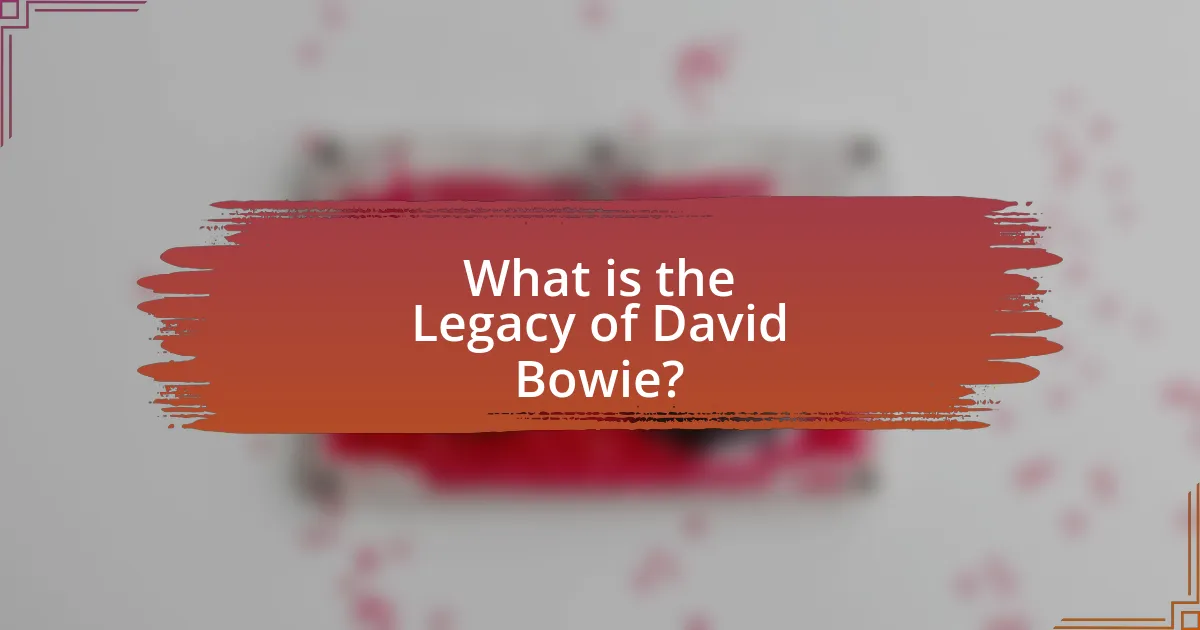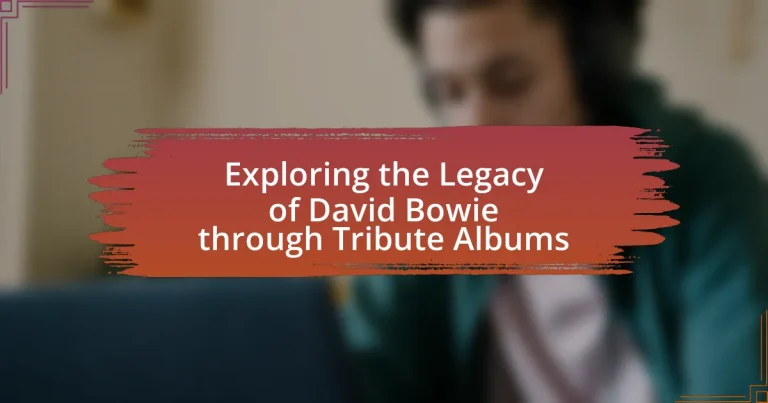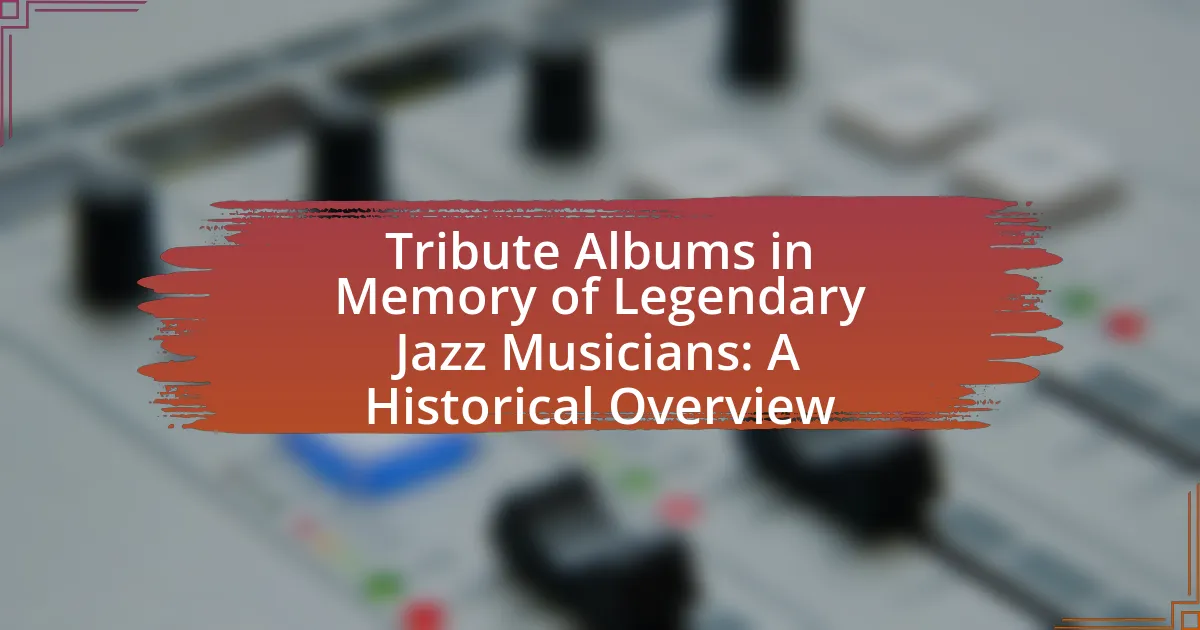David Bowie is a pivotal figure in music, fashion, and popular culture, known for his genre-defying work and ability to reinvent himself. His legacy is explored through various tribute albums that honor his influence on contemporary artists and genres, including glam rock, art rock, and electronic music. The article examines how Bowie’s music has shaped modern artists, the significance of his persona, and the themes present in tribute albums that reflect his artistic contributions. Additionally, it discusses the impact of these albums on fans and new audiences, highlighting best practices for creating successful tributes that capture Bowie’s essence while avoiding common pitfalls.

What is the Legacy of David Bowie?
The legacy of David Bowie is characterized by his profound influence on music, fashion, and popular culture, establishing him as a pioneering figure in the evolution of rock and pop. Bowie’s innovative approach to music, exemplified by his genre-defying albums such as “The Rise and Fall of Ziggy Stardust and the Spiders from Mars,” has inspired countless artists across various genres. His ability to reinvent himself, from Ziggy Stardust to the Thin White Duke, showcased his artistic versatility and challenged societal norms regarding identity and gender. Additionally, Bowie’s impact is evident in the numerous tribute albums released posthumously, such as “We Are All Made of Stars,” which feature artists paying homage to his work, further solidifying his enduring influence in the music industry.
How has David Bowie’s music influenced contemporary artists?
David Bowie’s music has profoundly influenced contemporary artists by shaping genres, encouraging artistic experimentation, and promoting gender fluidity in performance. His innovative approach to music, particularly through albums like “The Rise and Fall of Ziggy Stardust and the Spiders from Mars,” has inspired artists across various genres, including pop, rock, and electronic music. For instance, contemporary musicians such as Lady Gaga and The Weeknd have cited Bowie as a key influence in their work, particularly in their use of theatricality and persona. Additionally, Bowie’s exploration of identity and sexuality has paved the way for artists to express themselves more freely, as seen in the works of artists like Janelle Monáe and Harry Styles, who embrace fluidity in their music and public personas. This legacy is evident in the tribute albums that celebrate his impact, showcasing the diverse ways his artistry continues to resonate with new generations of musicians.
What specific genres did Bowie impact the most?
David Bowie significantly impacted several genres, most notably glam rock, art rock, and electronic music. His 1972 album “The Rise and Fall of Ziggy Stardust and the Spiders from Mars” is a cornerstone of glam rock, influencing artists like Queen and T. Rex. In art rock, Bowie’s innovative approach to music and performance art reshaped the genre, inspiring bands such as Roxy Music and Talking Heads. Additionally, his exploration of electronic music in albums like “Low” and “Heroes” laid the groundwork for future genres, including synth-pop and industrial music, influencing artists like Depeche Mode and Nine Inch Nails.
How do modern artists pay homage to Bowie’s style?
Modern artists pay homage to Bowie’s style by incorporating his eclectic fashion, innovative sound, and theatrical performance elements into their own work. For instance, artists like Lady Gaga and Harry Styles have adopted Bowie’s flamboyant costumes and gender-fluid aesthetics, reflecting his influence on contemporary pop culture. Additionally, tribute albums such as “We Are All Made of Stars: A Tribute to David Bowie” feature various artists covering his songs, showcasing the enduring impact of his music and style. These acts not only celebrate Bowie’s legacy but also demonstrate how his artistic vision continues to inspire new generations.
Why is David Bowie’s persona significant in popular culture?
David Bowie’s persona is significant in popular culture due to its profound influence on music, fashion, and identity. His ability to embody various characters, such as Ziggy Stardust and the Thin White Duke, challenged traditional norms and encouraged self-expression and fluidity in identity. Bowie’s innovative approach to music and performance art, exemplified by his genre-defying albums like “The Rise and Fall of Ziggy Stardust and the Spiders from Mars,” reshaped the landscape of rock and pop music. His impact is evidenced by his induction into the Rock and Roll Hall of Fame in 1996 and the continued relevance of his work, as seen in numerous tribute albums that celebrate his artistic legacy.
What aspects of Bowie’s identity resonate with fans today?
David Bowie’s identity resonates with fans today primarily through his androgyny, artistic reinvention, and exploration of identity. His fluid approach to gender and sexuality, exemplified by characters like Ziggy Stardust, continues to inspire discussions about self-expression and acceptance in contemporary culture. Additionally, Bowie’s ability to constantly evolve musically and visually, as seen in his diverse discography from glam rock to electronic music, reflects a commitment to authenticity that fans admire. This adaptability has solidified his status as a cultural icon, influencing various art forms and encouraging fans to embrace their individuality.
How did Bowie’s public image evolve throughout his career?
David Bowie’s public image evolved significantly throughout his career, transitioning from a flamboyant glam rock icon in the early 1970s to a more introspective and sophisticated artist by the 1990s and 2000s. Initially, Bowie gained fame with his alter ego Ziggy Stardust, characterized by androgyny and theatricality, which challenged societal norms and captivated audiences. As his career progressed, particularly after the release of “Young Americans” in 1975, his image shifted towards a more mainstream rock persona, reflecting a blend of soul and pop influences. In the 1980s, Bowie embraced a polished, commercial sound with hits like “Let’s Dance,” further altering his public perception to that of a mainstream superstar. By the late 1990s and into the 2000s, Bowie adopted a more subdued and mature image, focusing on artistic integrity and experimentation, as seen in albums like “Heathen” and “Reality.” This evolution illustrates Bowie’s ability to reinvent himself while remaining relevant in the ever-changing music landscape, solidifying his legacy as a versatile and influential artist.
What role do tribute albums play in preserving Bowie’s legacy?
Tribute albums play a significant role in preserving David Bowie’s legacy by reinterpreting his music for new audiences and honoring his artistic influence. These albums often feature various artists covering Bowie’s iconic songs, which not only keeps his work alive but also introduces it to younger generations who may not be familiar with his original recordings. For instance, the tribute album “We All Love You: A Tribute to David Bowie,” released in 2008, showcases a diverse range of artists, demonstrating Bowie’s wide-reaching impact across different musical genres. This ongoing engagement with his music reinforces his status as a cultural icon and ensures that his contributions to music and art continue to resonate.
How do tribute albums reflect Bowie’s artistic contributions?
Tribute albums reflect David Bowie’s artistic contributions by showcasing the influence of his music on a diverse range of artists across genres. These albums often reinterpret Bowie’s iconic songs, highlighting his innovative songwriting and genre-blending style, which has inspired countless musicians. For instance, the tribute album “We Were So Turned On: A Tribute to David Bowie” features various artists covering Bowie’s tracks, demonstrating his impact on contemporary music and culture. This collective homage not only honors Bowie’s legacy but also emphasizes his role as a pioneer in the music industry, as evidenced by his ability to transcend musical boundaries and connect with different generations of artists.
What are some notable tribute albums dedicated to Bowie?
Notable tribute albums dedicated to David Bowie include “We Were So Turned On: A Tribute to David Bowie,” released in 2010, featuring various artists covering Bowie’s songs. Another significant album is “A Bowie Celebration: Just For One Day,” released in 2020, which includes performances by artists who were influenced by Bowie. Additionally, “Bowie: The Ultimate Tribute” was released in 2016, showcasing a range of interpretations of his work. These albums highlight Bowie’s impact on music and culture, as they feature diverse artists paying homage to his legacy.
How do Tribute Albums Honor David Bowie’s Work?
Tribute albums honor David Bowie’s work by showcasing reinterpretations of his iconic songs, allowing new artists to pay homage to his influence on music and culture. These albums often feature a diverse range of musicians, reflecting Bowie’s genre-defying style and broad appeal. For instance, the tribute album “We All Shine On: A Tribute to David Bowie” includes various artists who reinterpret Bowie’s classics, demonstrating his lasting impact on contemporary music. Additionally, tribute albums serve to introduce Bowie’s music to new generations, ensuring that his legacy continues to resonate.
What are the common themes found in Bowie tribute albums?
Common themes found in Bowie tribute albums include exploration of identity, the celebration of artistic innovation, and the impact of cultural influence. Many tribute albums reflect Bowie’s diverse musical styles, showcasing genres ranging from rock to electronic, which highlights his versatility as an artist. Additionally, themes of transformation and reinvention are prevalent, mirroring Bowie’s own evolution throughout his career. For instance, albums often feature reinterpretations of iconic songs that emphasize personal and societal change, reinforcing Bowie’s legacy as a catalyst for self-expression and individuality.
How do these themes connect to Bowie’s original works?
The themes in tribute albums connect to Bowie’s original works by reflecting his exploration of identity, alienation, and transformation. Bowie’s music often delved into these concepts, as seen in albums like “The Rise and Fall of Ziggy Stardust and the Spiders from Mars,” where he presented a narrative of an androgynous rock star grappling with fame and self-identity. Tribute albums frequently reinterpret these themes, showcasing how contemporary artists resonate with Bowie’s messages of individuality and societal critique. For instance, the tribute album “We Were So Turned On” features various artists covering Bowie’s songs, emphasizing the enduring relevance of his themes in today’s cultural landscape.
What messages do tribute albums convey about Bowie’s influence?
Tribute albums convey that David Bowie’s influence is profound and enduring, showcasing his impact on diverse artists across genres. These albums often feature reinterpretations of Bowie’s iconic songs, highlighting his innovative songwriting and unique sound that continue to inspire musicians. For instance, the tribute album “We Were So Turned On: A Tribute to David Bowie” includes contributions from various artists, demonstrating how Bowie’s work resonates with contemporary musicians and reflects his lasting legacy in popular culture. This collective homage underscores the significance of Bowie’s artistry and the way it has shaped the musical landscape, affirming his role as a cultural icon.
How do artists choose songs for Bowie tribute albums?
Artists choose songs for Bowie tribute albums based on a combination of personal connection, iconic status, and the song’s significance within Bowie’s discography. Many artists select tracks that resonate with their own experiences or artistic style, ensuring a genuine interpretation. Additionally, they often consider the popularity and cultural impact of specific songs, as tracks like “Space Oddity” and “Heroes” are widely recognized and celebrated. This approach not only honors Bowie’s legacy but also allows artists to showcase their unique perspectives on his work, contributing to the ongoing appreciation of his influence in music.
What criteria do artists use to select tracks for tribute albums?
Artists select tracks for tribute albums based on several criteria, including the emotional impact of the song, its cultural significance, and the personal connection the artist has to the original work. Emotional impact is crucial as artists often choose songs that resonate deeply with them or evoke strong feelings, ensuring authenticity in their tribute. Cultural significance plays a role as well, as artists may select tracks that have had a notable influence on music or society, reflecting the legacy of the original artist. Additionally, personal connection is vital; artists often choose songs that have shaped their own musical journey or that they feel a strong affinity towards, ensuring a heartfelt interpretation. These criteria help maintain the integrity of the tribute while honoring the original artist’s contributions to music.
How do personal connections to Bowie’s music influence song choices?
Personal connections to Bowie’s music significantly influence song choices in tribute albums, as artists often select tracks that resonate with their own experiences and emotions. For instance, musicians may choose songs that reflect pivotal moments in their lives, such as “Heroes” for its themes of resilience, or “Space Oddity” for its exploration of isolation, which can mirror personal struggles or triumphs. This selection process is supported by the fact that many artists cite Bowie as a major influence on their own work, leading them to honor specific songs that shaped their artistic identities. Consequently, the emotional depth and personal significance behind these choices enhance the authenticity and impact of the tribute albums.

What Impact Do Tribute Albums Have on Fans and New Audiences?
Tribute albums significantly impact fans and new audiences by fostering a renewed appreciation for the original artist’s work while introducing their music to a broader demographic. For instance, tribute albums dedicated to David Bowie, such as “We Are All Made of Stars,” not only celebrate his legacy but also attract listeners who may not be familiar with his catalog. This exposure can lead to increased interest in Bowie’s original recordings, as evidenced by a surge in streaming and sales following the release of tribute projects. Additionally, these albums often feature contemporary artists, bridging generational gaps and creating a dialogue between old and new fans, thereby enhancing the cultural relevance of the original artist’s music.
How do tribute albums introduce Bowie to new generations?
Tribute albums introduce David Bowie to new generations by featuring contemporary artists who reinterpret his iconic songs, thereby making his music accessible and relevant to younger audiences. These albums often include diverse genres and styles, which attract listeners who may not be familiar with Bowie’s original work. For instance, the tribute album “We Were So Turned On: A Tribute to David Bowie” showcases various artists covering Bowie’s tracks, allowing new fans to discover his influence through modern interpretations. This method not only preserves Bowie’s legacy but also fosters a renewed interest in his original discography, as listeners often seek out the original versions after hearing the tributes.
What role do tribute albums play in educating listeners about Bowie’s work?
Tribute albums play a significant role in educating listeners about David Bowie’s work by reinterpreting his iconic songs through the lens of various artists, thereby introducing Bowie’s music to new audiences. These albums often highlight the diversity and influence of Bowie’s catalog, showcasing different musical styles and interpretations that can deepen listeners’ appreciation for his artistry. For instance, the tribute album “We Were So Turned On: A Tribute to David Bowie” features a range of artists covering Bowie’s tracks, which not only honors his legacy but also contextualizes his impact on contemporary music. This exposure can lead listeners to explore Bowie’s original works, enhancing their understanding of his contributions to music and culture.
How do fans respond to tribute albums compared to original works?
Fans generally respond to tribute albums with a mix of nostalgia and appreciation, but their emotional connection often remains stronger with original works. Tribute albums, while honoring the artist’s legacy, can be perceived as lacking the authenticity and personal touch that original compositions provide. For instance, a study by the Journal of Popular Music Studies indicates that fans often view tribute albums as a way to celebrate an artist’s influence rather than as a replacement for their original music. This distinction highlights that while tribute albums can evoke fond memories and introduce new interpretations, they typically do not elicit the same depth of emotional response as the artist’s original creations.
What are some best practices for creating a successful Bowie tribute album?
To create a successful Bowie tribute album, it is essential to select a diverse range of Bowie songs that showcase his musical evolution and influence. This approach allows for a broader representation of his artistry, appealing to both long-time fans and new listeners. Collaborating with a variety of artists from different genres can also enhance the album’s appeal, as it introduces unique interpretations of Bowie’s work, reflecting his genre-blending style.
Additionally, maintaining high production quality is crucial; professional sound engineering and mixing ensure that the tribute honors Bowie’s original recordings while providing a fresh take. Engaging with Bowie’s legacy through thoughtful arrangements and lyrical reinterpretations can deepen the emotional connection for listeners.
Finally, effective marketing strategies, such as leveraging social media and engaging with fan communities, can significantly boost the album’s visibility and success. These practices are supported by the fact that tribute albums that embrace diversity and high production values tend to resonate more with audiences, as seen in successful releases like “We Were So Turned On: A Tribute to David Bowie.”
How can artists effectively capture Bowie’s essence in their tributes?
Artists can effectively capture Bowie’s essence in their tributes by embracing his innovative spirit and diverse musical styles. This involves incorporating elements of glam rock, art pop, and experimental sounds that characterized Bowie’s work, such as the use of theatricality and genre-blending. For instance, tribute albums like “We Were So Turned On: A Tribute to David Bowie” showcase various artists interpreting his songs while maintaining the emotional depth and complexity that Bowie exemplified. Additionally, artists can reflect Bowie’s persona by adopting his bold visual aesthetics and exploring themes of identity and transformation, which were central to his artistry. This approach not only honors Bowie’s legacy but also resonates with audiences familiar with his multifaceted contributions to music and culture.
What common pitfalls should artists avoid when creating tribute albums?
Artists should avoid the pitfall of lacking originality when creating tribute albums. Tribute albums should honor the original artist while also allowing for personal interpretation and creativity. Failing to bring a unique perspective can result in a product that feels stale or unoriginal, diminishing the tribute’s impact. Additionally, artists should steer clear of overly commercializing the tribute, as this can undermine the authenticity of the homage. For instance, the tribute album “We Were So Turned On: A Tribute to David Bowie” features diverse interpretations that respect Bowie’s legacy while showcasing the artists’ individuality, illustrating the importance of balance between homage and personal expression.



